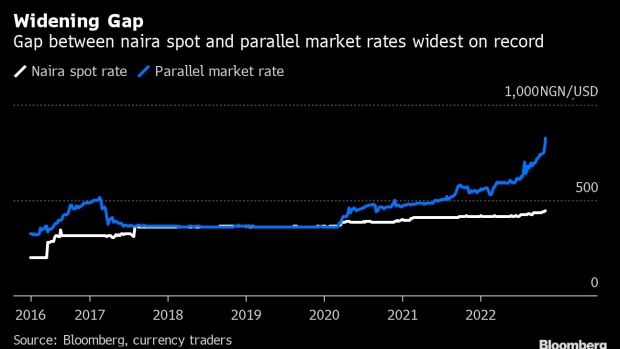Nov 2, 2022
Currency Redesign Deadline Sparks Rush to Buy Dollars in Nigeria
, Bloomberg News

(Bloomberg) -- The naira extended its decline against the dollar on the widely used illegal market as Nigerians rushed to buy greenbacks a week after the central bank said it would redesign higher-value notes.
Currency traders in the unauthorized parallel market offered naira at rates between 830 to 850 per dollar on Wednesday in Lagos, said Umar Salisu, a bureau de change operator who tracks the data in the nation’s commercial capital. The record low level further widens the spread from the official exchange rate, which also weakened to an unprecedented 443.11 to the dollar as of 1.44 p.m. in Lagos, to the largest-ever gap of more than 88%.
Demand for dollars in Africa’s largest economy has surged since the central bank last month announced a plan to replace 200-, 500- and 1,000-naira notes from mid-December. The old bills will cease to be legal tender at the end of January. The central bank argues that the redesign will mop up excess cash and help it better control money supply, while curbing criminality. As much as 85% of currency in circulation is outside the vaults of the nation’s banks, as has been the case for decades in Nigeria.
Street traders of the currency have had to pool resources in order to meet the increased demand, Salisu said. “Buyers come and we don’t have enough to give them, so we share the business with other traders.”
In the capital, Abuja, where rates are generally higher, and in the northern commercial city of Kano, the naira traded at as much as 850 per dollar on Wednesday, according to street traders.
“This scarcity is unprecedented,” said Abdullahi Tanko, a currency trader in the city. “I have never witnessed such a situation in this market.”
Nigeria maintains a multiple-exchange-rate regime, dominated by an official spot rate that is tightly controlled by the central bank. In the unauthorized black market, the currency is freely traded.
Finance Minister Zainab Ahmed warned that the currency redesign may weaken the naira as residents rush to change the old notes. But President Muhammadu Buhari backed the central bank, arguing the move would punish currency hoarders and curb inflation that hit a 17-year high in September.
Read: Buhari Endorses Nigeria Cash Plan as Finance Minister Balks
The looming Jan. 31 deadline, when the old notes will expire, is driving the rush for dollars, said Tanko. “They are trying to beat the deadline,” he said.
--With assistance from Ruth Olurounbi.
(Updates with naira exchange rates and comment from currency trader in sixth paragraph.)
©2022 Bloomberg L.P.






